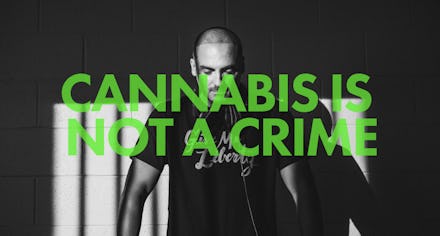The Weldon Project teams up with Russ in the fight to free non-violent marijuana offenders

The legal cannabis industry is booming in the U.S., with sales exceeding $17.5 billion last year, according to cannabis market research firm BDSA. But there’s a glaring disparity in who gets to reap the rewards: As mostly white entrepreneurs profit from the plant, Black and brown people remain disproportionately criminalized for it.
Cannabis justice nonprofit The Weldon Project wants to repair these and other harms of the war on drugs through the Mission Green initiative, which is urging President Biden to exonerate those sitting in federal prison for cannabis-related offenses. As part of this effort, The Weldon Project announced last month that its founder, Weldon Angelos, has partnered with rapper and producer Russ to free rapper Terrell “Ralo” Davis, who's been sentenced to eight years in prison for a cannabis-related offense.
Indeed, Mission Green’s strategy involves tapping into the high-profile connections it’s cultivated, especially in the hip-hop world, to pressure those in power to enact cannabis justice reform. “This is part of a larger effort with the hip-hop community to promote a national cannabis clemency campaign,” says Angelos, a former music producer who’s worked with the likes of Snoop Dogg and Tupac’s recording group. “Hip-hop is key here because the culture has been so instrumental in normalizing cannabis use and ending the cannabis stigma, so I give hip-hop a lot of credit on the progress we’ve made so far.”
For Angelos, the fight for cannabis justice is personal. In 2004, the then-producer phenom was sentenced to 55 years in prison for selling $1,000 worth of weed, The Weldon Project’s website explains. Thirteen years into his sentence, a judicial order led to his release, and former President Trump issued him a full pardon last December.
Angelos was inspired to start Mission Green amid the rising tide of weed legalization. (Thirty-six states have legalized medical cannabis to date, while 17 states and Washington, D.C. have legalized adult recreational use, per the National Conference of State Legislatures.) From prison, he watched corporations and entrepreneurs profit from selling cannabis, he tells Mic — while he and so many others served decades in prison for doing the same. “The hypocrisy was disturbing,” he says.
Mission Green works with those serving time in federal prison for cannabis-related offenses to petition for clemency, drawing on its vast network of legislators, as well as hip-hop artists, athletes, and other influencers to build their cases. So far, Angelos and his team has helped free over a dozen people serving life in prison for weed.
They also pair pro bono attorneys with people serving time who can’t afford legal counsel, and their reentry program helps those released obtain pardons or expunge their records. Because Mission Green’s leaders include those impacted by cannabis prohibition, “we understand fully the obstacles people face upon release,” Angelos says.
Now, Mission Green has its sights sets on freeing Ralo. The Atlanta rapper’s team reached out to Angelos after hearing about his work to help free incarcerated members of the hip-hop community, including Bad Boy Entertainment rapper Loon and Death Row Records co-founder Michael “Harry O” Harris. In response, Mission Green wrote a letter to President Biden urging him to grant clemency to Ralo, signed by Drake, Meek Mill, and Killer Mike, among other celebrities and influencers.
Russ, who’s launching a product line with cannabis company Wonderbrett, sees joining the effort to free Ralo as a step toward righting the wrongs of a legal system designed to benefit people like him. “I’m white, and I’m selling weed legally,” he tells Mic. “I can’t ignore my privilege, and I can’t ignore the absurd amount of incarcerations in the Black community for exactly what I’m out here doing. I want to try to help as much as I can.” And since he, like Ralo, hails from Atlanta, he says the campaign is "a good opportunity to also help someone from the local community."
Angelos echoes Russ’s belief that anyone who benefits financially from cannabis has a responsibility to give back to those who paid the price of their freedom for it. Their stories are “what helped move the needle in favor of legalization,” he points out — and the lingering effects of a felony conviction can hinder their job and other prospects even after their release.
So far, Angelos and his team has helped free over a dozen people serving life in prison for weed.
Mission Green also plans to lobby Congress to pass the MORE Act, which would remove cannabis from the Controlled Substances Act, ending its federal prohibition, Angelos says. He and his team already played a major role in the 2018 passage of the First Step Act, which reformed a host of drug mandatory minimums, including the statute that resulted in his 55-year prison sentence. He encourages anyone interested in cannabis justice to visit The Weldon Project’s website and sign up to volunteer or donate, or follow Mission Green on Instagram to stay up to date on its projects and events.
Consistent with the burgeoning cannabis industry, two-thirds of respondents to a 2019 Pew Research Center survey believed weed should be legal, a figure that's risen over the past decade. Mission Green is pushing the legal system to catch up with the times and bring true justice to those incarcerated for a plant that, like Angelos says, many just no longer consider criminal.